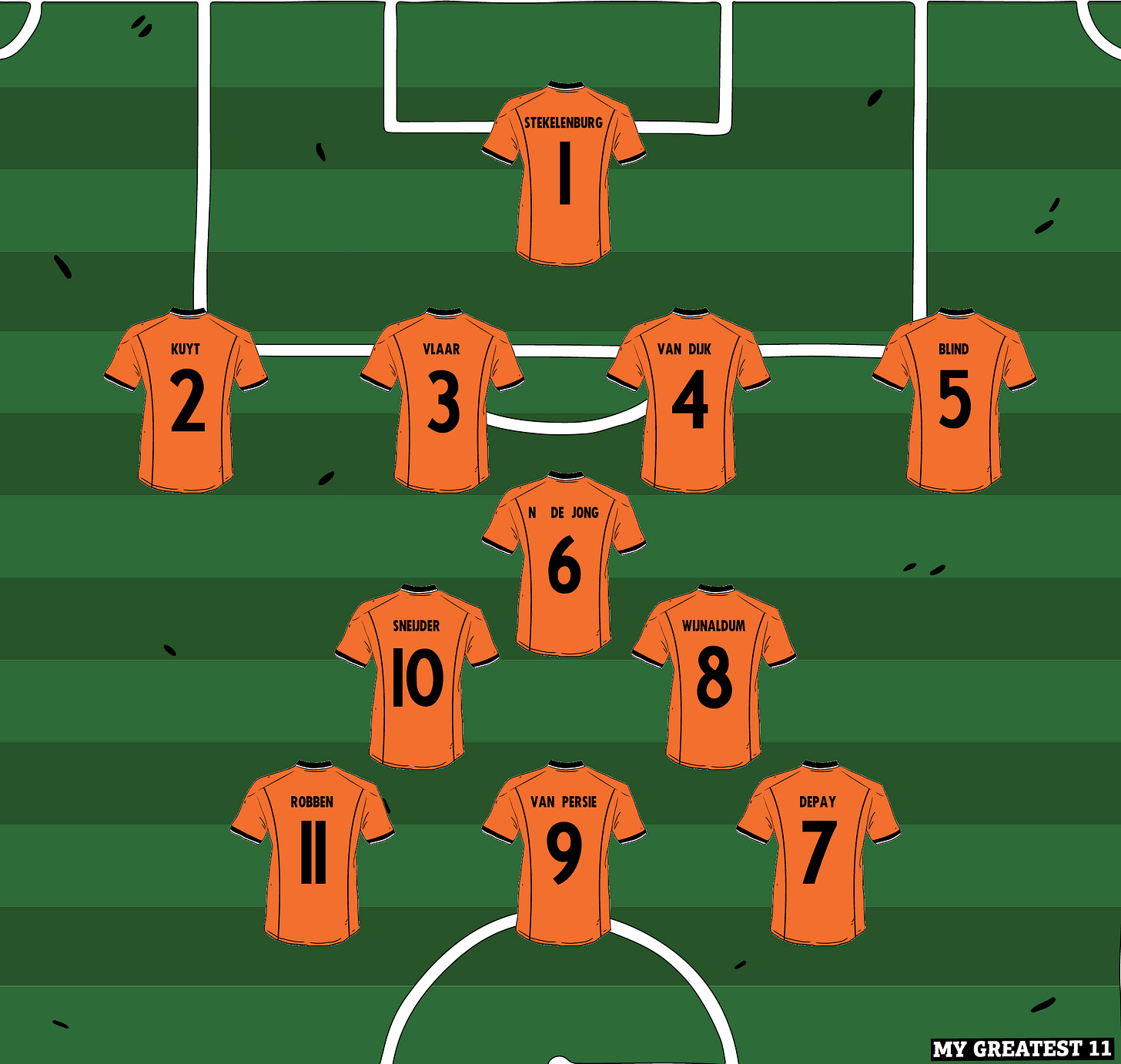The Netherlands' team of the decade
Many players have represented The Netherlands in the last decade. Some made their mark for the right reasons, some for the wrong, and some not at all, but who makes Oranje's team of the decade?
Our selection criteria for this team is pretty simple; the player to have made the most substantial and positive impact for Oranje in their position makes it. Oh, and it helps if they did so in one of the three major tournaments the Dutch have competed since the turn of the decade.
Now, that's cleared up, let's get on with it: This is Clockwork Oranje's Dutch team of the decade.
Maarten Stekelenburg
We start with one of the weaker positions in the team, with Stekelenburg and Jasper Cillessen the only real contenders. Both played excellently in their sides' medal-winning World Cup runs, but the former clinches it for us thanks to his performances in South Africa.
Stekelenburg had played second fiddle to Edwin van der Sar for most of his international career but after the latter retired in 2008, was Oranje's number one for the 2010 World Cup. He was solid throughout the tournament and made some great saves, including a crucial one on one stop in the final against Spain and this stunner from Kaka's shot in the last eight.
He remained Bert van Marwijk's first choice for Euro 2012, and there was little he could do as the team in front of him crumbled, losing every game. After that, age and injury brought an end to his international career.
Dirk Kuyt
Look, we know Kuyt isn't *really* a defender, but he played as a wing-back in the 2014 World Cup and was great. Besides, who else is there?
Kuyt began the decade playing on the left-wing in the 2010 World Cup and his work-rate was invaluable to the team's success. He also got a goal and three assists in his seven matches.
Heading into the 2014 tournament at the age of 33, he was expected to be a dressing room figure and rarely actually play. However, his versatility made him a key player. He started every game in the knockout stages, being deployed at right-wing back, left-wing back and, when Oranje needed a goal against Mexico, striker.
However old he was and wherever he was played, he was always one of his nations' best performers and hardest workers. With 104 caps and two World Cup medals, he'll go down as history as a true Dutch legend.
Ron Vlaar
It was a toss-up between Vlaar and Stefan de Vrij for this spot; Both were excellent at the 2014 World Cup, but we think the former was slightly better, so in he goes.
Vlaar started the decade as a backup option to Johnny Heitinga and Joris Mathijsen but made his debut at a major tournament in a disastrous Euro 2012 for the Netherlands.
By 2014 he had established himself as the experienced head in a young Dutch defence and was one of the World Cup's best defenders. Concrete Ron was excellent in every game but the highlight came in the Semi-Final when he put in a Man of the Match against Argentina, silencing Messi and co and making an iconic tackle on the all-time great.
He was career was cruelly ravaged by injuries after that summer, depriving him of a move to a big club. He has since rebuilt his career at AZ but is unlikely to ever add another cap to his name.
Virgil van Dijk
The fact that Van Dijk is the only player in this team yet to play at a major tournament for the Netherlands speaks volumes about how good he's been in the last four years.
The Liverpool man made his international debut in 2015 and has become a key player since, getting 33 caps and becoming captain after the retirement of Arjen Robben. His nation's resurgence is largely down to his rise and the partnership he has formed with Matthijs de Ligt. Oh, and he's scored some massive goals too.
https://twitter.com/si_soccer/status/1064633422893801473?s=20
Next summer he will play in his major international tournament. If he plays his best, he may well be the first Dutchman since Ruud Gullit to lift silverware for his country,
Daley Blind
Considering Giovanni van Bronchkorst retired in 2010 and Erik Pieters was the only left-back to play regularly between that and the arrival of Daley Blind, this was an easy spot to fill.
Blind made himself known to the world within 90 minutes of the 2014 World Cup with two glorious assists for Robin van Persie and Arjen Robben. He went on to start everyone game but one, being one of the competitions best players and scoring his first international goal against Brazil.
Since then, he has remained an important player for the Dutch, rarely failing to make a squad selection and starting games more often than not. He has recently been diagnosed with a heart issue, but he if he recovers by June, he'll be a key man at Euro 2020.
Nigel de Jong
Yes, we meant Nigel. Frenkie has been excellent since making his Netherlands debut in 2018, but Nigel was one of the team's best players at both World Cups this decade. We just couldn't leave him out.
Despite being remembered for putting a boot in Xabi Alonso's chest in the final, De Jong was a large reason why the Netherlands made it that far in 2010. The side had a weak back-line, but De Jong largely made up for this, shielding them and allowing the forwards more creative freedom.
It was largely the same case in 2014 as he was again an unsung hero for Oranje, adding much-needed steel and stability to Van Gaal's side. He was tasked with man-marking Lionel Messi in the semi-final and, along with Ron Vlaar, completely silenced him.
He played his last game for his country in 2015 and most likely won't go down in history as one of their better players, or even as the best De Jong, but he was excellent in the 2010s nonetheless.
Georginio Wijnaldum
The group of players born after the golden era of Robben and co, and before the likes of Memphis Depay, is known as the Netherlands' "missing generation". One man to break free from that tag though is Gini Wijnaldum.
The Liverpool man made his debut in 2011 and went on to start every knockout stage match at the 2014 World Cup, scoring in the third-place play-off against Brazil.
He continues to key for the Dutch to this day. He was their top scorer in 2019 and has averaged a goal every three games since making his debut.
Wesley Sneijder
He may have peaked at the very beginning of the decade, but Sneijder remained an important figure for the Netherlands up until his retirement in 2018.
The undoubted highlight for him was the 2010 World Cup. Having just won the treble with Inter Milan, he maintained his incredible form to be one of the tournament's best players. The playmaker scored five goals and was simply unplayable at times.
Four years on, his ability wasn't at the same level, but he still delivered when Oranje needed him most. With the Dutch 1-0 down in the dying seconds against Mexico in the last 16, Sneijder stepped up to smash in an equaliser.
After his last World Cup, he remained in the frame enough to take the record of the most ever caps for the Netherlands, 134, before bowing out last year.
Arjen Robben
To put things simply, Arjen Robben has been the Netherlands' player of the decade, and it isn't even close.
He missed the first two games of the 2010 World Cup with injury but made a huge impact upon his return. He scored against Slovakia and Uruguay and was generally and of the side's biggest threats. The only downside is that he missed a huge chance in the final against Spain.
Against all logic, he was even better in 2014. In the first game against Spain, he scored two goals, running faster than any footballer ever had in the process. He went on to score one more, get three assists and make the team of the tournament. Without him, the Dutch would never have finished third.
Incredibly, Robben continued to be Oranje's star man for years after the World Cup. He retired from international football in 2017 and showed he was still their best player in his last ever game against Sweden, scoring two goals.
Robin van Persie
Van Persie and Klaas-Jan Huntelaar were both excellent for the Netherlands in the 2010s, becoming the nation's two highest-ever scorers. However, much like most Oranje managers, we give the former the nod.
Unlike the other members of the big three, Sneijder and Robben, Van Persie generally struggled to produce his best football on the big stage, scoring just one goal in both the 2010 World Cup and the 2012 Euros.
However, he was lethal in the qualification campaigns for each tournament and did before better in the 2014 World Cup, scoring four goals, including *that* header.
He ended his international career with 50 goals in 102 caps and captained his country in many of them. Since his retirement, they have missed a striker of such quality.
Memphis Depay
The man to finally step up and fill the void left up front has been Memphis Depay, who is now arguably the Netherlands most important player.
Five years ago, he burst onto the scene in Brazil as a bright-eyed 20-year old. He went on to score two goals and was nominated for the Young Player of the Tournament award.
He's gone from strength to strength since then, moving from his position out wide to become the focal point of the team's attack. In 2019, he directly contributed to most of the side's goals and, if he can recover from his injury in time, will be critical to the Netherlands' hopes of winning Euro 2020.
How they set up

Not a bad side, right? Lining up in a very Dutch 4-3-3, we think this team could go places. Kuyt and Blind are solid defensively but could contribute going forward too, while the midfield three is perfectly balanced (as all things should be - one for the Marvel fans). Ahead of them, the prospect of Robben, Van Persie and Depay playing together at their peaks is a tantalising one.
Be sure to follow Clockwork Oranje on Twitter, like the Facebook page and subscribe on Soundcloud!



